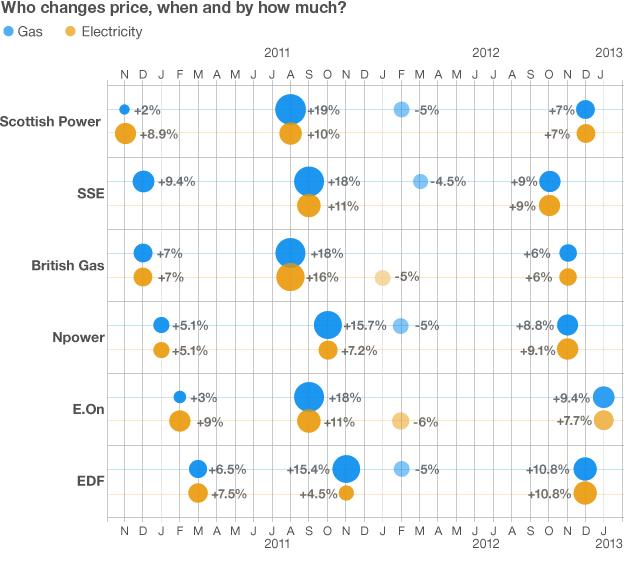Energy bills: Ofgem must take firmer action, MPs say
- Published
Which? Richard Lloyd: "We want a much simpler way of presenting energy prices, to put companies under pressure"
Stronger action is needed to ensure energy customers get a fair deal, a committee of MPs has told the regulator Ofgem.
The MPs have called on it to be less timid in dealing with "anti-competitive" behaviour by suppliers.
They also warned that recent plans by Ofgem and the government might still fail to help customers make meaningful price comparisons "at a glance".
Ofgem said it would analyse the details of the report before responding.
The report of the Energy and Climate Change Committee, external said: "We find it unsatisfactory that Ofgem should be so hesitant about launching preliminary investigations into potentially anti-competitive behaviour.
"We understand that Ofgem plans to reduce barriers to competition... but we believe that a more proactive approach should be adopted."
An Ofgem spokesman said: "We do share the committee's concern about transparency, which is why we publish a weekly report setting out wholesale and retail prices."
"We also share the committee's concerns about competition in the energy market, which is why we are progressing with the most far-reaching reforms since competition began, to make it simpler, clearer and fairer for consumers."
The MPs welcomed the recent initiatives by Ofgem and the government to force suppliers to offer customers a much smaller and simpler range of tariffs, but said stronger action might be needed quickly if the proposals did not work.
"Whether or not these measures will improve the situation for consumers remains to be seen, but it is crucial that if they do not, the government and Ofgem are prepared to take stronger action to ensure that consumers get a fair deal from energy providers," the MPs said.
"Ofgem should be prepared to amend the measures it has implemented if there is no evidence after 12 months that they are making it easier for consumers to switch."
'Confusion marketing'
The MPs' report highlighted well-known problems: that not enough people are willing to switch suppliers and that they are particularly put off by the vast and confusing array of tariffs on offer.
The MPs said the big six energy firms took advantage of customer inertia to overcharge people who never switch, while offering cheap "loss leader" deals to lure new customers.
That in turn made it harder for smaller suppliers to break into the market, stifling the competition that might help keep prices down.
"In a healthy market, suppliers would compete for a share of the market by continually striving to offer better deals, or by offering a unique or particularly high standard of service to differentiate themselves from competitors," the MPs said.
"Currently, the opposite appears to be true of the energy market, with suppliers adopting similar pricing and hedging strategies, adding to consumers' perception that suppliers are 'all the same'."
"If the largest suppliers have millions of customers who are unlikely to switch, there is little incentive for suppliers to offer these 'sticky' customers lower prices or a better service," the report added.
Unfair prices?
Consumers are in the middle of another round of price increases, with E.On recently becoming the last of the big six to raise prices this winter.
In October 2011, Ofgem began an attack on the "confusion marketing" tactics of the energy industry by proposing that each supplier should be compelled to offer basic "no-frills" tariffs so that customers could compare them easily.
Last month the regulator revised this plan, suggesting that each supplier should offer a maximum of only four tariffs each for gas and electricity.
But Ofgem was then trumped when the government announced its own variation on these plans: that all current customers should be moved to the cheapest of those tariffs, not merely have them highlighted to them, as Ofgem had been proposing.
The consumer organisation Which? renewed its own attack on energy suppliers, accusing them of still trying to bamboozle customers over their new tariffs.
Which? said the government's recent proposals needed to be made even stronger, by introducing a single unit price for energy, a quicker switching process, and with all tariffs becoming available for all types of payment.
"After the recent round of price hikes and announcements about the cost to consumers of investment in the energy system, it's no wonder people are left questioning whether the price they are paying is a fair one," said Richard Lloyd of Which?
Rising bills
One step the MPs recommended was that all firms should be forced to publish a figure for their costs per customer, so that any loss leading deals would be clear to competitors, though the MPs said these below-cost tariffs should not be banned.
The MPs also expressed their concern that most members of the public did not realise that energy bills were going to keep on rising substantially, and that most people would seriously have to consider ways of improving their home insulation or cutting their gas and electricity usage.
Paul Massara, who will next month take up the chief executive role at energy firm RWE Npower, said he looked forward to an "open conversation" with the committee.
"We share the concern about the growing pressure on all households, especially those in poverty, as fuel bills rise due to the cost of replacing the energy infrastructure, government and regulatory policies and world energy markets," he said.
"I therefore welcome the call for a transparent market and would also support an honest conversation about energy costs; we will ourselves promote a simple, transparent and honest engagement with customers and others."

- Published20 November 2012
- Published17 December 2012
- Published20 November 2012
- Published19 October 2012